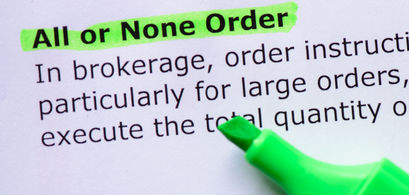Definition
The term All-or-None order refers to broker instructions to buy or sell a quantity of securities in their entirety, or none at all. If an All-or-None order cannot be executed immediately, it remains open until it is executed or is closed at the end of the trading day.
Explanation
Typically used when referring to stocks, an All-or-None (AON) order instructs a broker to buy or sell a predetermined amount of securities in their entirety or do not execute the transaction. A partial sale or purchase is not considered acceptable. The order can only execute if a single transaction can cover all of the designated shares.
An AON order remains active until cancelled. If the supply of securities does not allow for the execution of the transaction at the desired quantity, the order may be canceled at the close of the trading day.
Example
An investor places an AON order for 1,000 shares of Company ABC at $35.50 per share. At this point, the broker does not fill the order until they can obtain 1,000 shares at $35.50. If there are only 500 shares available at $35.50, the order is not partially filled. If 1,000 shares do not materialize at this price, the order is canceled at the end of the day. If the investor still wishes to obtain 1,000 shares at this price, the order will have to be placed again the next trading day.




